- Home
- Patricia MacLachlan
Skylark Page 2
Skylark Read online
Page 2
Each day Papa dropped a rope with a stone down the well to measure the water level.
“Is it past the mark?” asked Sarah.
Papa nodded.
“How much, Jacob?”
Papa held out his hands a foot apart.
Caleb and I got up into the wagon to go to town.
“Soon we’ll have to haul water for the animals,” said Papa.
“We can do that,” said Sarah.
“We’ll have to measure out our own water,” said Papa as he climbed up.
“But we already do that, Jacob.”
Papa looked down at Sarah.
“We’ll have to use less.”
Sarah stared at Papa, then got up to sit next to him.
“We can do that, too,” she said firmly.
We drove off down the road. After a while Caleb poked his head between Sarah and Papa. Papa looked at him.
“So, Caleb?”
“I put the glass on the post,” said Caleb.
Papa nodded but didn’t say anything.
“To measure the rain when it comes,” Caleb added.
“Thank you for that,” said Papa.
“You’re welcome,” said Caleb happily.
He sat back in the wagon and folded his arms. Papa smiled.
All the way to town I looked for green. But as far as I could see the fields were brown. The wheat fields were dry. Turkey vultures circled in the distance. There was no green.
Everything seemed slow in town, as if the heat had taken over. Papa left the wagon in the shade of the granary and slowly unloaded his last bags of grain from the wagon. Slowly he walked inside.
Mrs. Parkley’s store was cool. Rose and Violet were there, Rose carrying Tom, who smiled at me. But Maggie had her arms around Caroline, who was crying.
“Caroline? What’s wrong, Maggie?” said Sarah.
“Their well is dry,” Maggie said softly.
“Caroline,” said Sarah. “What can we do?”
“There’s nothing to do,” Caroline said, drying her tears. “We’ve already packed up.”
“Packed up!” said Sarah, shocked. “Where will you go?”
“They have family,” said Maggie.
Caroline took her packages and went to the door. She turned suddenly, her face sad.
“Joseph says we’ll come back,” she said. “But we won’t. I know we won’t.”
She opened the door and left. Maggie walked over to the door and looked out.
“Surely we can do something,” Sarah said. “We could haul water, Maggie. We would all work harder.”
Sarah’s voice grew louder, and Caleb moved closer to me.
“You can’t just give up!” said Sarah. “You can’t just give up everything you’ve worked for. . . .”
Maggie whirled around, her face angry.
“You don’t know how hard this is, Sarah,” she said, angrily. “You haven’t been in this kind of trouble before!”
Sarah stared at Maggie, then at the others in the store. Maggie reached over and took Sarah’s hand. She opened the door and pulled her outside. I watched the two of them cross the dusty street. Maggie’s arm went around Sarah, but they kept walking. Papa came out from the granary and watched them, too, Matthew beside him.
“Is Sarah angry?” asked Caleb.
I looked down at his worried face.
“No,” I said. “Sarah’s not angry.”
Caleb sighed.
“Sarah likes to make things right,” he said.
We watched without speaking, and then Joseph and Caroline’s wagon passed, all packed with chairs and clothes and a cupboard, pots and pans tied on. Sarah turned to watch it, and Papa watched, too, from across the street. And then the wagon turned a corner and was gone.
6
The ride home from town was quiet, the wind blowing dust around us.
“Any news in town?” asked Sarah wearily.
“Some news,” said Papa. “Good news.”
“Good news? What good news?”
“Your birthday is coming soon. Mattie wrote to remind me.”
“She didn’t!”
“She did,” said Papa. “So—what do you want? Jewels, silk, travel?”
Sarah laughed.
“Travel? Where would I go, Jacob?”
“Somewhere green,” said Papa. “Somewhere cool.”
Sarah looked at Papa.
“Do you think I would leave?” asked Sarah softly.
Papa was silent.
“Can we sing, Sarah?” asked Caleb.
“It’s too hot, Caleb,” she said. “Too hot for singing.”
Papa flicked the reins over the horses’ backs, but they wouldn’t go faster.
“It’s even too hot for Jack and Old Bess,” he said.
I leaned back against the empty grain sacks and took out my journal, but it lay in my lap.
Caleb moved over close to me.
“Why aren’t you writing?”
“There’s nothing new to write,” I said, lifting my hair off my neck. “There’s nothing good. Just the heat. The fields are dried up. There’s no rain.”
“There will be rain,” said Caleb. “Papa said so.” He pointed. “That was the field where the wildflowers grew, remember, when Sarah came? The pond was full then. We went swimming and fell asleep in the grass.”
I stared at Caleb, then out at the fields, remembering when the fields were green. Remembering when the days were cool. Remembering when Sarah came by train and Caleb and I were afraid that she’d miss the sea.
Suddenly, Caleb stood up.
“Papa! Fire!”
In the west meadow a thread of smoke rose.
“Hold on,” yelled Papa.
Sarah dropped to the wagon floor, and we held on as the horses raced for the yard.
Papa jumped down.
“Soak the grain sacks in the pond water! Hurry!”
Sarah and Papa ran to beat out the flames. We could see red flames in the dry grasses now. Caleb and I soaked the sacks, then ran closer to the fire, water dripping down our clothes.
“Stay back,” warned Papa. “There’s a wind coming up.”
Nick and Lottie ran from the barn, barking.
And then suddenly Sarah screamed. Her skirt was on fire. Papa turned and threw Sarah to the ground and smothered the flames with a sack. He pulled her up.
“Are you all right?”
When Sarah nodded, Papa began to shout at her.
“I told you to stay back. You never listen! I told you there was wind!”
Caleb took my hand.
Sarah began beating the fire, now nearly out.
“You can’t put out the fire alone!” she shouted. “Stop yelling at me!”
And then there was only smoke, the grasses all black and smoldering. Papa beat at one small flame. He stood back, and there was silence. Nick and Lottie stopped barking.
“We’ll have to watch for fires all the time, now, even at night,” said Papa, out of breath.
Sarah and Papa began walking back to the house. Sarah’s hair was down; her clothes were wet and sooty. Papa looked at her, then away.
“You’re a sight, you know,” he said softly.
Sarah didn’t answer.
Papa looked at her again, then smiled a small smile.
“You look . . . beautiful,” he said.
I held my breath. I had never heard Papa say such a thing to Sarah.
Sarah kept on walking. Then she turned and looked at him.
“Do you really think I would leave?” she said. “Just for somewhere cool? Somewhere green?”
This time Papa was silent. The two of them walked away from the blackened grass, past the dogs, and past us just as if we weren’t there.
And that night, when Papa went out to close the barn door, Sarah ran after him. I saw them from my window. Papa took Sarah in his arms and kissed her, and they turned around and around and around, dust swirling over them in a cloud.
* * *
My dre
ams are cool. They are cool and the color of the sky before rain, a dark and peaceful blue, the clouds edged in black before the rain comes and the earth smells sharp and sweet. I remember that smell.
The days are hot and still now.
Only my dreams are cool.
* * *
7
We sat on the porch out of the terrible sun, Maggie fanning herself, Sarah mixing batter for biscuits. Rose and Violet rolled a ball in the dirt to Tom. Caleb sat watching the sky for clouds.
“This heat,” said Maggie wearily. “I dream of my old home sometimes. And I dream of long, cool mornings of sleep without the baby waking!”
Sarah smiled.
“Night dreams or daydreams?” she asked.
“What’s a day dream?” asked Caleb.
Sarah sat back and looked at Tom crawling happily in the dirt.
“Sometimes, no matter where you are, you think of something sweet and cool. A place, maybe. And suddenly it’s there. Or maybe it’s something you wish for . . . and it is so near you can touch it, smell it . . . hear the sound of it . . .”
Sarah looked up suddenly as if caught up in her thoughts.
“She’s dreaming about Maine,” Caleb whispered to me.
No. It’s not Maine, I thought. It’s not Maine she’s thinking about. It’s something else.
Tom grabbed the ball and held it over his head. Sarah smiled.
“I have dreams, Sarah,” Caleb said.
“Good dreams, Caleb?” she asked.
“I dream about rain,” said Caleb. “Do you? Do you dream about rain?”
Sarah reached over and took Caleb on her lap.
“Yes, Caleb. I dream about rain.”
“Good,” he said. “Then it will come true.”
But rain was only in our dreams. The winds came every day, blowing dust through the windows and into the house until it covered the furniture and got into the food and our clothes and hair. The land got even drier, and we stopped taking baths. Every day we hauled river water for the animals in big wooden barrels.
And then the worst thing happened.
We drove to the river in our wagon, empty barrels in the back. Clouds hung high in the sky. Maggie sat in her wagon by the riverbed. Matthew stood on the bluff over the river, looking down.
“Hello, Maggie,” called Sarah.
But Maggie didn’t speak. She didn’t even look at us.
We got down from the wagon. The river was nearly dry, only a small trickle in the red prairie dirt.
Everyone was quiet.
“What will we do?” whispered Sarah.
“We’ll have to travel farther for water,” said Papa.
“Think about it, Jacob,” said Matthew. “It will be a three-day trip, maybe four. When we get back home, then what? Water for the crops? There are no crops.”
Papa looked at Matthew, then away over the land.
Matthew sighed.
“Maggie and I have been talking about another way,” he said.
“What?” asked Sarah.
“I think that what Matthew means is that they’re thinking about leaving,” said Papa softly.
Sarah turned and looked up at Maggie in the wagon.
“Leaving?” she said, her voice rough and dry like the fields.
Maggie climbed down and went behind the wagon, Sarah following her. I walked closer and stood out of sight, and saw Sarah put out her hand to touch Maggie. But Maggie took a step away, as if Sarah’s comfort was too hard. And I heard words I wish I hadn’t heard.
“I hate this land,” said Sarah. “I don’t have to love it the way Matthew and Jacob love it. They give it everything. Everything! And it gives nothing back.”
“They don’t know anywhere else, Sarah,” said Maggie.
I closed my eyes, but I couldn’t close out Sarah’s words.
“Jacob once said his name was written in this land, but mine isn’t. It isn’t!” said Sarah angrily.
“You are like the prairie lark, you know,” said Maggie. “It sings its song above the land to let all the birds know it’s there before it plunges down to earth to make its home. But you have not come to earth, Sarah.”
There was silence then, and I opened my eyes again.
“You don’t have to love this land,” said Maggie. “But if you don’t love it, you won’t survive. Jacob’s right. You have to write your name in the land to live here.”
Sarah didn’t speak. She took a handful of dry prairie grass in her hands, letting it crumble through her fingers. Then she walked away from us, through the dried grass, out onto the brown prairie that stretched all the way to the sky. She stood there all alone until Papa went to tell her it was time to go home.
* * *
We hung wildflowers from the ceiling to dry them for winter, I remember. Sarah cut our hair, tossing it into the fields so the birds could use it for nests.
And we sang.
When Sarah read books with us, even her words were like a song.
* * *
8
Sarah and I sat in the kitchen. The air was thick with the heat, and there was no breeze. There hadn’t been any wind for days. Sarah was writing a letter to the aunts in Maine. I wrote in my journal.
“Remember the wildflowers?” I asked Sarah. “And the roses that grew on the fence? Remember singing?”
Sarah looked up.
“Yes,” she said. She reached out and touched my hair. “I remember.”
“Papa! Papa! Coyote!” shouted Caleb from outside.
Sarah and I ran outside. By the paddock fence a thin coyote was drinking water out of the water pail.
“He’ll kill Moonbeam!” shouted Caleb.
Papa came from the field, took a step toward the coyote, then turned and ran to the house. He came out with his rifle.
“Jacob! What are you going to do?” cried Sarah.
“Go inside, Sarah,” he said.
Papa raised his rifle to shoot the coyote, but Sarah grabbed the barrel of the rifle.
“No! Don’t do it, Jacob. Don’t!”
“Sarah! Stop!” yelled Papa.
Papa tried to push her away, and the coyote looked up at the sound of their voices. Slowly he ran away over the fields, stopping once to look back. Then he was gone.
Sarah began to cry.
“He only wanted water. Water, Jacob!”
Caleb climbed over the paddock fence and stood next to me. Papa took Sarah’s arm and turned to Caleb.
“Put the animals in the barn, Caleb,” he said.
Caleb turned and walked to the barn.
Tears streamed down Sarah’s face.
“Water!” she said. “He only wanted water. Just like us. . . .”
She slumped to the ground and put her hands over her face as she cried.
“Get Sarah something to drink, Anna,” said Papa.
He took off his hat and sat down on the ground next to her.
“Anna,” he said sharply. “Now!”
I turned and went to the water barrel and scooped out a cup of water. Papa put his arms around Sarah.
His voice was soft.
“Sarah. Sarah,” he said softly. “It will be all right. It will be all right.”
But Sarah cried and cried. And when Papa turned and looked at me, I knew that nothing was all right.
The look in his eyes was fear.
And that night, when I came in from the barn to go to bed, there was something else missing from the fence. Missing like Sarah’s roses. Caleb’s glass was gone.
“They’re coming!” said Caleb, looking out the upstairs window.
He wore a clean shirt, and his hair was brushed smooth. I wore the dress I had worn when Papa and Sarah were married. Outside, wagons came into the yard.
“Will this make Sarah happy?” Caleb asked me, worried.
I watched more wagons drive in. I saw Maggie dressed in a rose dress and a straw hat.
“Yes,” I said. “This will make Sarah happy.”
&nbs
p; “Anna? Caleb? What is this?” said Sarah in the bedroom doorway.
We whirled around, silent. Sarah walked to the window to look out, too, but I took her hand and pulled her out into the hallway. Papa looked up the stairs at her. He wore a vest and his hair was slicked back. He smiled at her.
“Happy birthday, Sarah,” he said.
“There are guests. And presents, Sarah!” said Caleb.
“But I’m not dressed,” said Sarah.
“Then get dressed,” said Papa softly.
Outside there was a table in the shade of the house, set with food and lemonade. Maggie and Matthew were there, and Rose and Violet and the baby. All the neighbors were there, too. Papa carried something covered with a cloth out to the table.
“What is it?” asked Maggie.
“You’ll see,” said Papa.
“Here she is!” someone said.
We all turned, and Sarah came out on the porch in her white dress.
“Happy birthday, Sarah,” said Papa.
“Happy birthday,” everyone called.
Sarah smiled at the sight of them, everyone washed and clean as if the prairie winds had stopped covering us all with dust.
“A present from the aunts,” said Papa.
He took the cloth away, and there was a phonograph. I handed him a record and he put the needle on it. Suddenly, music filled the yard. Sarah stared. Papa walked up to her and held out his hand. She smiled and came down the steps and they began to dance. Maggie and Matthew began to dance, too, the baby between them. Everyone danced, then, in the dirt yard, the light around them all yellow like an old photograph. Sarah buried her face in Papa’s shoulder, and Caleb smiled at me. And for a little while, as the sun began to set, as they danced, everyone forgot about the drought. For a while, everyone was happy again. Even Sarah. Even Papa.
The last of the wagons left in the moonlight. Sarah and Papa waved good-bye. Caleb was asleep under the table and Papa took him off to bed. Then Papa helped Sarah carry the phonograph inside.
“I have a present for you, Sarah,” I said. I handed her a small book.
“Anna, what is this?” said Sarah.
“It’s a book I started. About you. About our family,” I said.
Papa went out to the porch. Sarah sat down and opened the book. She began to read.
“Is it past the mark?” asked Sarah.
Papa nodded.
“How much, Jacob?”
Papa held out his hands a foot apart.
Caleb and I got up into the wagon to go to town.
“Soon we’ll have to haul water for the animals,” said Papa.
“We can do that,” said Sarah.
“We’ll have to measure out our own water,” said Papa as he climbed up.
“But we already do that, Jacob.”
Papa looked down at Sarah.
“We’ll have to use less.”
Sarah stared at Papa, then got up to sit next to him.
“We can do that, too,” she said firmly.
We drove off down the road. After a while Caleb poked his head between Sarah and Papa. Papa looked at him.
“So, Caleb?”
“I put the glass on the post,” said Caleb.
Papa nodded but didn’t say anything.
“To measure the rain when it comes,” Caleb added.
“Thank you for that,” said Papa.
“You’re welcome,” said Caleb happily.
He sat back in the wagon and folded his arms. Papa smiled.
All the way to town I looked for green. But as far as I could see the fields were brown. The wheat fields were dry. Turkey vultures circled in the distance. There was no green.
Everything seemed slow in town, as if the heat had taken over. Papa left the wagon in the shade of the granary and slowly unloaded his last bags of grain from the wagon. Slowly he walked inside.
Mrs. Parkley’s store was cool. Rose and Violet were there, Rose carrying Tom, who smiled at me. But Maggie had her arms around Caroline, who was crying.
“Caroline? What’s wrong, Maggie?” said Sarah.
“Their well is dry,” Maggie said softly.
“Caroline,” said Sarah. “What can we do?”
“There’s nothing to do,” Caroline said, drying her tears. “We’ve already packed up.”
“Packed up!” said Sarah, shocked. “Where will you go?”
“They have family,” said Maggie.
Caroline took her packages and went to the door. She turned suddenly, her face sad.
“Joseph says we’ll come back,” she said. “But we won’t. I know we won’t.”
She opened the door and left. Maggie walked over to the door and looked out.
“Surely we can do something,” Sarah said. “We could haul water, Maggie. We would all work harder.”
Sarah’s voice grew louder, and Caleb moved closer to me.
“You can’t just give up!” said Sarah. “You can’t just give up everything you’ve worked for. . . .”
Maggie whirled around, her face angry.
“You don’t know how hard this is, Sarah,” she said, angrily. “You haven’t been in this kind of trouble before!”
Sarah stared at Maggie, then at the others in the store. Maggie reached over and took Sarah’s hand. She opened the door and pulled her outside. I watched the two of them cross the dusty street. Maggie’s arm went around Sarah, but they kept walking. Papa came out from the granary and watched them, too, Matthew beside him.
“Is Sarah angry?” asked Caleb.
I looked down at his worried face.
“No,” I said. “Sarah’s not angry.”
Caleb sighed.
“Sarah likes to make things right,” he said.
We watched without speaking, and then Joseph and Caroline’s wagon passed, all packed with chairs and clothes and a cupboard, pots and pans tied on. Sarah turned to watch it, and Papa watched, too, from across the street. And then the wagon turned a corner and was gone.
6
The ride home from town was quiet, the wind blowing dust around us.
“Any news in town?” asked Sarah wearily.
“Some news,” said Papa. “Good news.”
“Good news? What good news?”
“Your birthday is coming soon. Mattie wrote to remind me.”
“She didn’t!”
“She did,” said Papa. “So—what do you want? Jewels, silk, travel?”
Sarah laughed.
“Travel? Where would I go, Jacob?”
“Somewhere green,” said Papa. “Somewhere cool.”
Sarah looked at Papa.
“Do you think I would leave?” asked Sarah softly.
Papa was silent.
“Can we sing, Sarah?” asked Caleb.
“It’s too hot, Caleb,” she said. “Too hot for singing.”
Papa flicked the reins over the horses’ backs, but they wouldn’t go faster.
“It’s even too hot for Jack and Old Bess,” he said.
I leaned back against the empty grain sacks and took out my journal, but it lay in my lap.
Caleb moved over close to me.
“Why aren’t you writing?”
“There’s nothing new to write,” I said, lifting my hair off my neck. “There’s nothing good. Just the heat. The fields are dried up. There’s no rain.”
“There will be rain,” said Caleb. “Papa said so.” He pointed. “That was the field where the wildflowers grew, remember, when Sarah came? The pond was full then. We went swimming and fell asleep in the grass.”
I stared at Caleb, then out at the fields, remembering when the fields were green. Remembering when the days were cool. Remembering when Sarah came by train and Caleb and I were afraid that she’d miss the sea.
Suddenly, Caleb stood up.
“Papa! Fire!”
In the west meadow a thread of smoke rose.
“Hold on,” yelled Papa.
Sarah dropped to the wagon floor, and we held on as the horses raced for the yard.
Papa jumped down.
“Soak the grain sacks in the pond water! Hurry!”
Sarah and Papa ran to beat out the flames. We could see red flames in the dry grasses now. Caleb and I soaked the sacks, then ran closer to the fire, water dripping down our clothes.
“Stay back,” warned Papa. “There’s a wind coming up.”
Nick and Lottie ran from the barn, barking.
And then suddenly Sarah screamed. Her skirt was on fire. Papa turned and threw Sarah to the ground and smothered the flames with a sack. He pulled her up.
“Are you all right?”
When Sarah nodded, Papa began to shout at her.
“I told you to stay back. You never listen! I told you there was wind!”
Caleb took my hand.
Sarah began beating the fire, now nearly out.
“You can’t put out the fire alone!” she shouted. “Stop yelling at me!”
And then there was only smoke, the grasses all black and smoldering. Papa beat at one small flame. He stood back, and there was silence. Nick and Lottie stopped barking.
“We’ll have to watch for fires all the time, now, even at night,” said Papa, out of breath.
Sarah and Papa began walking back to the house. Sarah’s hair was down; her clothes were wet and sooty. Papa looked at her, then away.
“You’re a sight, you know,” he said softly.
Sarah didn’t answer.
Papa looked at her again, then smiled a small smile.
“You look . . . beautiful,” he said.
I held my breath. I had never heard Papa say such a thing to Sarah.
Sarah kept on walking. Then she turned and looked at him.
“Do you really think I would leave?” she said. “Just for somewhere cool? Somewhere green?”
This time Papa was silent. The two of them walked away from the blackened grass, past the dogs, and past us just as if we weren’t there.
And that night, when Papa went out to close the barn door, Sarah ran after him. I saw them from my window. Papa took Sarah in his arms and kissed her, and they turned around and around and around, dust swirling over them in a cloud.
* * *
My dre
ams are cool. They are cool and the color of the sky before rain, a dark and peaceful blue, the clouds edged in black before the rain comes and the earth smells sharp and sweet. I remember that smell.
The days are hot and still now.
Only my dreams are cool.
* * *
7
We sat on the porch out of the terrible sun, Maggie fanning herself, Sarah mixing batter for biscuits. Rose and Violet rolled a ball in the dirt to Tom. Caleb sat watching the sky for clouds.
“This heat,” said Maggie wearily. “I dream of my old home sometimes. And I dream of long, cool mornings of sleep without the baby waking!”
Sarah smiled.
“Night dreams or daydreams?” she asked.
“What’s a day dream?” asked Caleb.
Sarah sat back and looked at Tom crawling happily in the dirt.
“Sometimes, no matter where you are, you think of something sweet and cool. A place, maybe. And suddenly it’s there. Or maybe it’s something you wish for . . . and it is so near you can touch it, smell it . . . hear the sound of it . . .”
Sarah looked up suddenly as if caught up in her thoughts.
“She’s dreaming about Maine,” Caleb whispered to me.
No. It’s not Maine, I thought. It’s not Maine she’s thinking about. It’s something else.
Tom grabbed the ball and held it over his head. Sarah smiled.
“I have dreams, Sarah,” Caleb said.
“Good dreams, Caleb?” she asked.
“I dream about rain,” said Caleb. “Do you? Do you dream about rain?”
Sarah reached over and took Caleb on her lap.
“Yes, Caleb. I dream about rain.”
“Good,” he said. “Then it will come true.”
But rain was only in our dreams. The winds came every day, blowing dust through the windows and into the house until it covered the furniture and got into the food and our clothes and hair. The land got even drier, and we stopped taking baths. Every day we hauled river water for the animals in big wooden barrels.
And then the worst thing happened.
We drove to the river in our wagon, empty barrels in the back. Clouds hung high in the sky. Maggie sat in her wagon by the riverbed. Matthew stood on the bluff over the river, looking down.
“Hello, Maggie,” called Sarah.
But Maggie didn’t speak. She didn’t even look at us.
We got down from the wagon. The river was nearly dry, only a small trickle in the red prairie dirt.
Everyone was quiet.
“What will we do?” whispered Sarah.
“We’ll have to travel farther for water,” said Papa.
“Think about it, Jacob,” said Matthew. “It will be a three-day trip, maybe four. When we get back home, then what? Water for the crops? There are no crops.”
Papa looked at Matthew, then away over the land.
Matthew sighed.
“Maggie and I have been talking about another way,” he said.
“What?” asked Sarah.
“I think that what Matthew means is that they’re thinking about leaving,” said Papa softly.
Sarah turned and looked up at Maggie in the wagon.
“Leaving?” she said, her voice rough and dry like the fields.
Maggie climbed down and went behind the wagon, Sarah following her. I walked closer and stood out of sight, and saw Sarah put out her hand to touch Maggie. But Maggie took a step away, as if Sarah’s comfort was too hard. And I heard words I wish I hadn’t heard.
“I hate this land,” said Sarah. “I don’t have to love it the way Matthew and Jacob love it. They give it everything. Everything! And it gives nothing back.”
“They don’t know anywhere else, Sarah,” said Maggie.
I closed my eyes, but I couldn’t close out Sarah’s words.
“Jacob once said his name was written in this land, but mine isn’t. It isn’t!” said Sarah angrily.
“You are like the prairie lark, you know,” said Maggie. “It sings its song above the land to let all the birds know it’s there before it plunges down to earth to make its home. But you have not come to earth, Sarah.”
There was silence then, and I opened my eyes again.
“You don’t have to love this land,” said Maggie. “But if you don’t love it, you won’t survive. Jacob’s right. You have to write your name in the land to live here.”
Sarah didn’t speak. She took a handful of dry prairie grass in her hands, letting it crumble through her fingers. Then she walked away from us, through the dried grass, out onto the brown prairie that stretched all the way to the sky. She stood there all alone until Papa went to tell her it was time to go home.
* * *
We hung wildflowers from the ceiling to dry them for winter, I remember. Sarah cut our hair, tossing it into the fields so the birds could use it for nests.
And we sang.
When Sarah read books with us, even her words were like a song.
* * *
8
Sarah and I sat in the kitchen. The air was thick with the heat, and there was no breeze. There hadn’t been any wind for days. Sarah was writing a letter to the aunts in Maine. I wrote in my journal.
“Remember the wildflowers?” I asked Sarah. “And the roses that grew on the fence? Remember singing?”
Sarah looked up.
“Yes,” she said. She reached out and touched my hair. “I remember.”
“Papa! Papa! Coyote!” shouted Caleb from outside.
Sarah and I ran outside. By the paddock fence a thin coyote was drinking water out of the water pail.
“He’ll kill Moonbeam!” shouted Caleb.
Papa came from the field, took a step toward the coyote, then turned and ran to the house. He came out with his rifle.
“Jacob! What are you going to do?” cried Sarah.
“Go inside, Sarah,” he said.
Papa raised his rifle to shoot the coyote, but Sarah grabbed the barrel of the rifle.
“No! Don’t do it, Jacob. Don’t!”
“Sarah! Stop!” yelled Papa.
Papa tried to push her away, and the coyote looked up at the sound of their voices. Slowly he ran away over the fields, stopping once to look back. Then he was gone.
Sarah began to cry.
“He only wanted water. Water, Jacob!”
Caleb climbed over the paddock fence and stood next to me. Papa took Sarah’s arm and turned to Caleb.
“Put the animals in the barn, Caleb,” he said.
Caleb turned and walked to the barn.
Tears streamed down Sarah’s face.
“Water!” she said. “He only wanted water. Just like us. . . .”
She slumped to the ground and put her hands over her face as she cried.
“Get Sarah something to drink, Anna,” said Papa.
He took off his hat and sat down on the ground next to her.
“Anna,” he said sharply. “Now!”
I turned and went to the water barrel and scooped out a cup of water. Papa put his arms around Sarah.
His voice was soft.
“Sarah. Sarah,” he said softly. “It will be all right. It will be all right.”
But Sarah cried and cried. And when Papa turned and looked at me, I knew that nothing was all right.
The look in his eyes was fear.
And that night, when I came in from the barn to go to bed, there was something else missing from the fence. Missing like Sarah’s roses. Caleb’s glass was gone.
“They’re coming!” said Caleb, looking out the upstairs window.
He wore a clean shirt, and his hair was brushed smooth. I wore the dress I had worn when Papa and Sarah were married. Outside, wagons came into the yard.
“Will this make Sarah happy?” Caleb asked me, worried.
I watched more wagons drive in. I saw Maggie dressed in a rose dress and a straw hat.
“Yes,” I said. “This will make Sarah happy.”
&nbs
p; “Anna? Caleb? What is this?” said Sarah in the bedroom doorway.
We whirled around, silent. Sarah walked to the window to look out, too, but I took her hand and pulled her out into the hallway. Papa looked up the stairs at her. He wore a vest and his hair was slicked back. He smiled at her.
“Happy birthday, Sarah,” he said.
“There are guests. And presents, Sarah!” said Caleb.
“But I’m not dressed,” said Sarah.
“Then get dressed,” said Papa softly.
Outside there was a table in the shade of the house, set with food and lemonade. Maggie and Matthew were there, and Rose and Violet and the baby. All the neighbors were there, too. Papa carried something covered with a cloth out to the table.
“What is it?” asked Maggie.
“You’ll see,” said Papa.
“Here she is!” someone said.
We all turned, and Sarah came out on the porch in her white dress.
“Happy birthday, Sarah,” said Papa.
“Happy birthday,” everyone called.
Sarah smiled at the sight of them, everyone washed and clean as if the prairie winds had stopped covering us all with dust.
“A present from the aunts,” said Papa.
He took the cloth away, and there was a phonograph. I handed him a record and he put the needle on it. Suddenly, music filled the yard. Sarah stared. Papa walked up to her and held out his hand. She smiled and came down the steps and they began to dance. Maggie and Matthew began to dance, too, the baby between them. Everyone danced, then, in the dirt yard, the light around them all yellow like an old photograph. Sarah buried her face in Papa’s shoulder, and Caleb smiled at me. And for a little while, as the sun began to set, as they danced, everyone forgot about the drought. For a while, everyone was happy again. Even Sarah. Even Papa.
The last of the wagons left in the moonlight. Sarah and Papa waved good-bye. Caleb was asleep under the table and Papa took him off to bed. Then Papa helped Sarah carry the phonograph inside.
“I have a present for you, Sarah,” I said. I handed her a small book.
“Anna, what is this?” said Sarah.
“It’s a book I started. About you. About our family,” I said.
Papa went out to the porch. Sarah sat down and opened the book. She began to read.

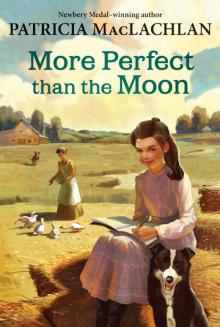 More Perfect Than the Moon
More Perfect Than the Moon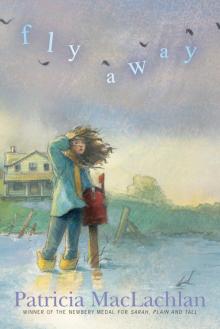 Fly Away
Fly Away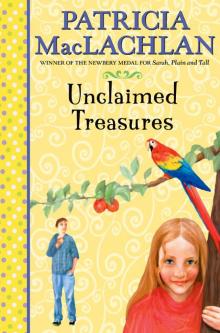 Unclaimed Treasures
Unclaimed Treasures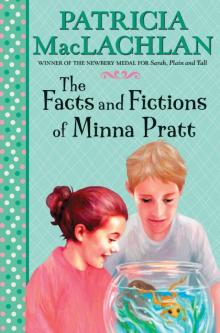 The Facts and Fictions of Minna Pratt
The Facts and Fictions of Minna Pratt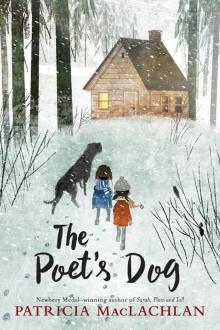 The Poet's Dog
The Poet's Dog Journey
Journey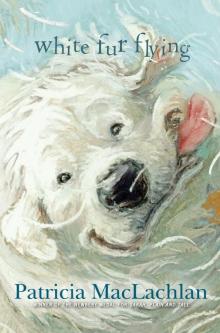 White Fur Flying
White Fur Flying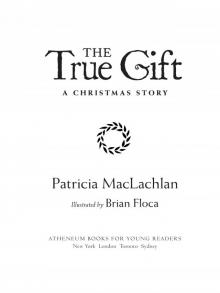 The True Gift: A Christmas Story
The True Gift: A Christmas Story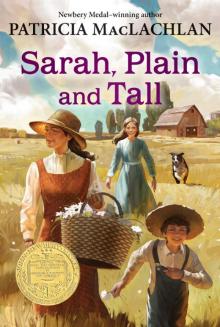 Sarah, Plain and Tall
Sarah, Plain and Tall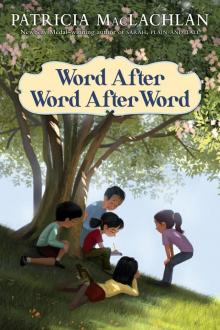 Word After Word After Word
Word After Word After Word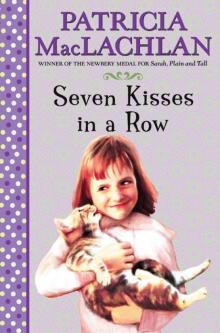 Seven Kisses in a Row
Seven Kisses in a Row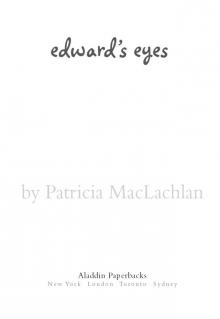 Edward's Eyes
Edward's Eyes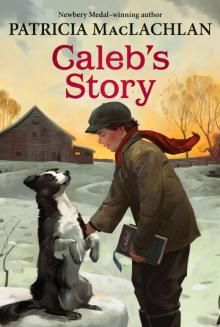 Caleb's Story
Caleb's Story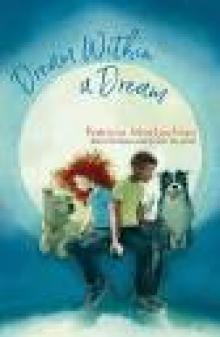 Dream Within a Dream
Dream Within a Dream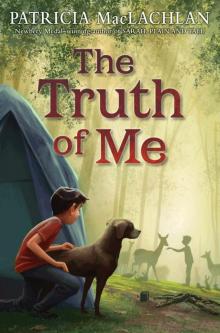 The Truth of Me
The Truth of Me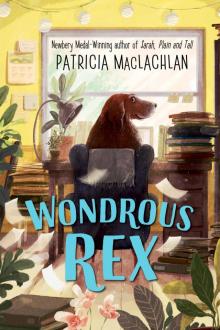 Wondrous Rex
Wondrous Rex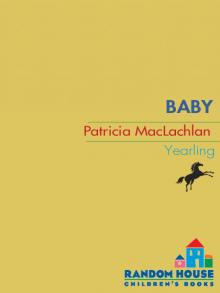 Baby
Baby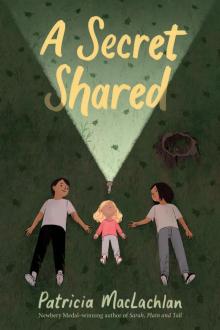 A Secret Shared
A Secret Shared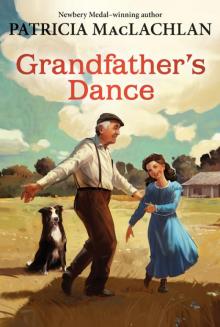 Grandfather's Dance
Grandfather's Dance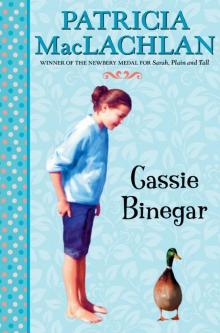 Cassie Binegar
Cassie Binegar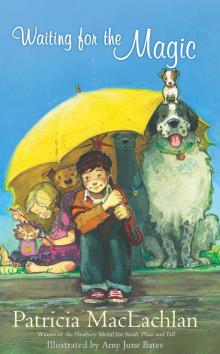 Waiting for the Magic
Waiting for the Magic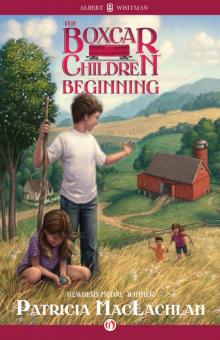 The Boxcar Children Beginning
The Boxcar Children Beginning My Father's Words
My Father's Words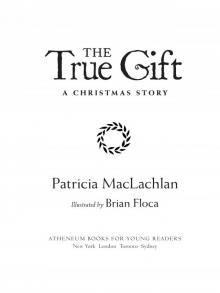 The True Gift
The True Gift